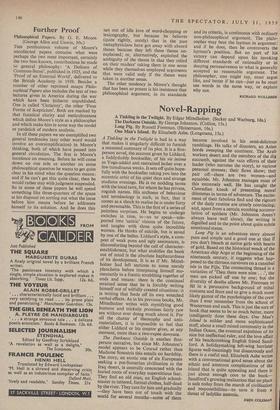Novel-Rapping
A Tinkling in the Twilight is bad in a way that makes it singularly difficult to furnish a reasoned summary of its plot. It is a first- person novel, the account given by Liddard, a fuddyduddy bookseller, of his vie intime as Yoga-addict and restrained lecher over a few tumultuous weeks. It sets off quite hope- fully with the bookseller taking you into the eccentric orbit of his quiet days and strange studious evenings. He is on nodding terms with the local tarts, for whom he has private, roguish names. His archness of behaviour and terminology is such, in fact, that it comes as a shock to realise he is under forty and personable. This is the first of a series of pointless surprises. He begins to undergo switches in time, is—so to speak—tele- ported into 'satiric' visions of the future, and tangles with three quite incredible women. He thinks of suicide, but is saved by one of the belles. Liddard's style, a com- post of weak puns and ugly assonances, is discomforting beyond the call of character- establishment, but what stultifies the book out of mind is the absolute haphazardness of its development. It is as if Mr. Mittel- holzer had left sections to some unruly planchette before interposing himself mo- mentarily in a frantic scrabbling together of ends and means: there is the continual strained sense that he is forcibly writing himself out of wilfully created situations: it is writing that feeds off its own wretched verbal effects. As in his previous books, Mr. Mittelholzer writes with mystifying good humour and tricksily promises fairly raw sex without ever doing much about it. For all the chatter of theosophy and anti- materialism, it is impossible to feel that either Liddard or his creator gives, at any moment, more than a two-rupee damyata.
The Darkness Outside is another first- person narrative, but since Mr. Johnston's model appears to be Conrad rather than Madame Sosostris this entails no hardship. The story, an exotic one of six Europeans seeking a pre-Sumerian civilisation in the Iraq desert, is centrally concerned with the buried roots of everyday superstitious fear. They find an old man, an English school- master in tattered, formal clothes, half-dead by the river. They care for him and gradually —they have been out of touch with the world for several months—some of them become involved in his semi-delirious ramblings. He talks of disasters, an Asian horde sweeping the continent. The Arab workers desert and the members of the dig succumb, against the vain efforts of their leader (who narrates the story), to various personal stresses; their flaws show; they pair off—there are two women—and squabble. Mr. Johnston manages most of this extremely well. He has caught the Conradian knack of presenting moral dilemmas in terms of adventure. The excite- ment of their fabulous find and the rigours of the daily routine are utterly convincing; and, apart from a certain numbing accumu- lation of epithets (Mr. Johnston doesn't always leave well alone), the writing is dignified and to the point about quite subtle emotional states.
Long Pig is an adventure story almost pure and simple and a good one at that if you don't blench at native girls with hearts of gold. Based on the historical wreck of the American ship Argo at the beginning of the nineteenth century, it suggests what hap- pened to the thirteen survivors on a cannibal isle in the Fijis. The connecting thread is a variation of 'Then there were nine . . the men are picked off one by one; but the diversity of deaths allows Mr. Foreman to fill in a persuasive background of tribal customs and fears and to give a much more likely gamut of the psychologies of the crew than I ever remember from the school of Westerman and such. This is just the sort of book that seems to be so much better, more intelligently done these days. One Man's Island is milder and more sophisticated stuff, about a small mixed community in the Indian Ocean, the eventual expulsion of its nice but ineffectual ruler, and the love affair of his beachcombing English friend Sand- ford. A holidaymaking left-wing barrister figures well-meaningly but disastrously and there is a rueful end. Elizabeth Ashe writes with a conversational good sense about the ethnic and amorous complications of the island that is quite appealing and there is just about enough core to the book- Sandford's growing realisation that no place is safe today from the march of civilisation and responsibilities—to save it from a threat of ladylike anaemia.






























 Previous page
Previous page